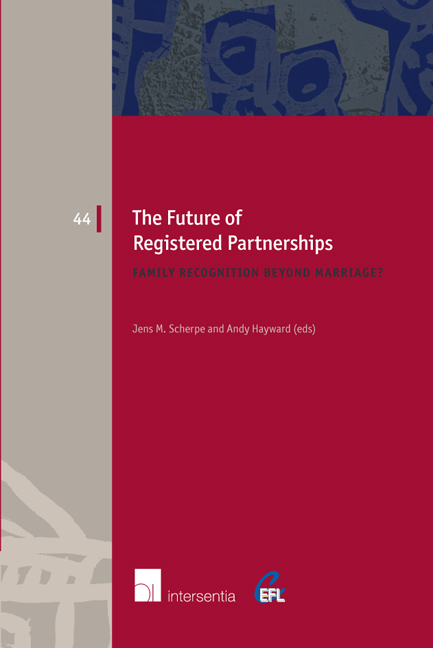Book contents
- Frontmatter
- Foreword
- Preface
- Contents
- List of Contributors
- The Future of Registered Partnerships: An Introduction
- Questionnaire
- Part I Registered Partnerships as a Functional Equivalent to Marriage
- Part II Registered Partnerships as an Alternative to Marriage
- Part III Registered Partnerships in a Time of Transition
- Part IV Alternative Models for Registered Partnerships: Beyond Conjugality, Beyond Formality
- Part V Registered Partnerships, Discrimination and Human Rights
- An ECHR Right to Access a Registered Partnership?
- Registered Partnerships in European Union Law
- Part VI Comparative Perspective and Conclusions
- Index
- European Family Law Series
An ECHR Right to Access a Registered Partnership?
from Part V - Registered Partnerships, Discrimination and Human Rights
Published online by Cambridge University Press: 22 September 2018
- Frontmatter
- Foreword
- Preface
- Contents
- List of Contributors
- The Future of Registered Partnerships: An Introduction
- Questionnaire
- Part I Registered Partnerships as a Functional Equivalent to Marriage
- Part II Registered Partnerships as an Alternative to Marriage
- Part III Registered Partnerships in a Time of Transition
- Part IV Alternative Models for Registered Partnerships: Beyond Conjugality, Beyond Formality
- Part V Registered Partnerships, Discrimination and Human Rights
- An ECHR Right to Access a Registered Partnership?
- Registered Partnerships in European Union Law
- Part VI Comparative Perspective and Conclusions
- Index
- European Family Law Series
Summary
INTRODUCTION
In contrast to opposite-sex unmarried partners, same-sex partners did not receive recognition as ‘families’ under Article 8(1) of the European Convention on Human Rights until recently. But as same-sex couples in Europe increasingly sought recognition and protection of their relationships, a number of them turned to Article 8, read with Article 14, at Strasbourg, arguing that the state is under an obligation stemming from Article 14 to avoid discrimination against them within the scope of respect for family life under Article 8(1). This chapter traces a movement at Strasbourg from eventual recognition of same-sex couples as ‘families’ to (qualified) recognition of their right to a registered partnership under Article 8. At present, a right of opposite-sex couples to choose a registered partnership under Article 8 has not been established. That is because, as this chapter explains, they can access formalisation of their union via marriage, as they can do in all Member States. The Strasbourg Court currently takes the view that the decision whether to enable such couples to have a choice between marriage and a registered partnership is within the margin of appreciation of the Member State.
The Strasbourg jurisprudence in the area of registered partnerships takes a restrained stance, due to its reliance on finding a consensus in Member States on affording same-sex couples access to a means of formalising their union. A number of the decisions have arisen in the context of transsexual relationships, but the fact that part of the case law concerns transsexuals should not be allowed to obscure the analogies that are explicitly – and can be impliedly – drawn in it in relation to non-transsexual couples seeking to access registered partnerships. Thus, while the discussion below of necessity covers cases that on a superficial reading appear to be partially unrelated to access to registered partnerships, that is not in fact the case, as this chapter seeks to demonstrate. As this chapter concludes, at present the Strasbourg Court has demonstrated, partially via the vehicle of certain transsexual cases, that it is prepared to give some, qualified, support to acceptance of a positive obligation under Article 8 to introduce registered partnerships in Member States that have not so far introduced them.
- Type
- Chapter
- Information
- The Future of Registered PartnershipsFamily Recognition Beyond Marriage?, pp. 471 - 496Publisher: IntersentiaPrint publication year: 2017
- 1
- Cited by



